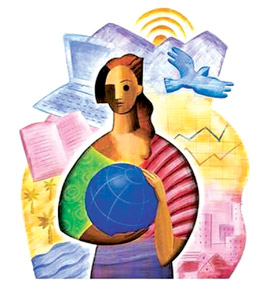Who will feed the world?
From field to kitchen,
from seed to food, Indian women’s strength is diversity which is why
genetically engineered crops only serve to disempower them, writes
Vandana Shiva.
As yet another example of the desperate ‘science’ of Monsanto, it is
now being argued that genetically engineered Bt cotton introduced in
India in 1997 - has liberated Indian women. In a paper authored by
Arjunan Subramanian, Kerry Kirwan, David Pink and Matin Qaim, the
argument is that the crop produces massive gains for women’s employment
in India.
But this argument is false on many grounds.
Firstly, women have traditionally been seed keepers and seed
breeders, which means that the knowledge and skills related to seed
conservation and seed breeding have been women’s expertise. The seed
economy was a women’s economy. As long as seed was in women’s hands,
there was no debt and there were no suicides. Women have acted as
custodians of the common genetic heritage through the shortage and
preservation of grain.

In a study of rural women of Nepal, it was found that seed selection
is primarily a female responsibility. In some 60 percent of cases, women
alone decided what type of seed to use.
As to who actually performs the task of seed selection, in cases
where the family decides to use their own seeds, this work is done by
women alone in more than 80 percent of the households, by both sexes in
8 percent and by men alone in only 10 percent.
Throughout India, even in years of scarcity, grain for seed was
conserved in every household, so that the cycle of food production was
not interrupted. The peasant women of India have carefully maintained
the genetic base of food production over thousands of years. This common
wealth, which has evolved over millennia, has been defined as ‘primitive
cultivars’ by the masculinist view of seeds, which sees its own new
products as ‘advanced’ varieties.
The replacement of traditional varieties of seeds with genetically
engineered Bt cotton is an appropriation of women’s skills, knowledge
and decision-making. This is disempowerment of women, not empowerment.
Moreover, women have always played a significant role in agriculture:
most farmers in India are women.
The replacement of biodiverse cropping systems evolved by women with
monocultures of Bt cotton leads to a decline in food production.
This undermines women’s food sovereignty and erodes food security,
which in women’s hands is women’s empowerment. Further, it destroys
women’s work relating to agricultural production and post-harvest food
processing. Interestingly women’s work in relation to food sovereignty
has been defined as ‘femimanual’ work.
The growing of food is the most important source of livelihood for
the majority of the world’s people, especially women. It is also the
most fundamental economic right. Women were the world’s original food
producers, and they continue to be central to food-production systems in
the Third World in terms of the work they do in the food chain.
The worldwide destruction of feminine knowledge of agriculture,
evolved over four to five thousand years, by a handful of white male
scientists in less than two decades has not merely violated women as
experts, but gone hand in hand with the ecological destruction of
Nature’s processes and the economic destruction of poorer people in
rural areas.
Agriculture has been evolved by women. Most of the world’s farmers
are women, and most girls are future farmers.
Girls learn the skills and knowledge of farming in the fields and
farms. What is grown on farms determines whose livelihoods are secured,
what is eaten, how much is eaten, and by whom it is eaten.
- TWN Features |



